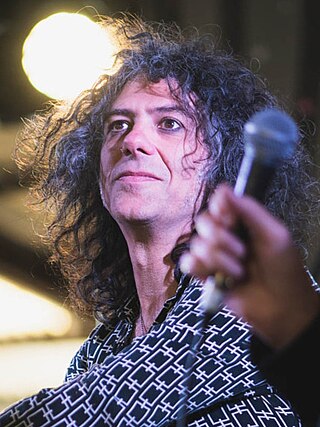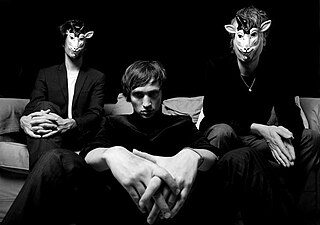Related Research Articles

Psychedelic rock is a rock music genre that is inspired, influenced, or representative of psychedelic culture, which is centered on perception-altering hallucinogenic drugs. The music incorporated new electronic sound effects and recording techniques, extended instrumental solos, and improvisation. Many psychedelic groups differ in style, and the label is often applied spuriously.

Basque music refers to the music made in the Basque Country, reflecting traits related to its society/tradition, and devised by people from that territory. While traditionally more closely associated to rural based and Basque language music, the growing diversification of its production during the last decades has tipped the scale in favour of a broad definition.
Sky were an English/Australian instrumental rock group that specialised in combining a variety of musical styles, most prominently rock, classical and jazz. The group's original and best-known line-up featured two Australians - classical guitarist John Williams and electric guitarist Kevin Peek - alongside three Britons - bass player Herbie Flowers, drummer/percussionist Tristan Fry and keyboard player Francis Monkman.

The Legendary Pink Dots are an Anglo-Dutch rock band formed in London in August 1980. In 1984, the band moved to Amsterdam, playing with rotating musicians and having, as core members, singer/songwriter/keyboardist Edward Ka-Spel and keyboardist Phil Knight. In 2022, founding member and synthesist Philip Knight retired from touring, and Randall Frazier joined the band on synths, samples and electronics.
Psychedelic folk is a loosely defined form of psychedelia that originated in the 1960s. It retains the largely acoustic instrumentation of folk, but adds musical elements common to psychedelic music.
Rock and roll entered Greece in the middle of the 1960s. Greek rock performers in the field include Pavlos Sidiropoulos, Dimitris Poulikakos. Greek rock bands well known globally are Aphrodite's Child, Socrates Drank the Conium and The Last Drive.
Amon Düül was a West German political art commune formed out of the student movement of the 1960s that became well known for its free-form musical improvisations. This spawned two rock groups, Amon Düül and the more famous Amon Düül II. After both groups disbanded in the 1970s, some of the original members reunited in the 1980s under the name Amon Düül again, though this incarnation is commonly referred to as Amon Düül UK to avoid confusion with earlier versions of the band.
Psychedelic music is a wide range of popular music styles and genres influenced by 1960s psychedelia, a subculture of people who used psychedelic drugs such as 5-MeO-DMT, DMT, LSD, mescaline, and psilocybin mushrooms, to experience synesthesia and altered states of consciousness. Psychedelic music may also aim to enhance the experience of using these drugs and has been found to have a significant influence on psychedelic therapy.

The Head Shop is an American psychedelic rock band from New York that released one eponymous album on Epic in 1969. The album cover features a swirling group of multi-colored boxes that surround a black-and-white image of a shrunken head. The back cover is mostly black with minimal copy but also includes a shot of the band lit from beneath.
Psychedelic pop is pop music that contains musical characteristics associated with psychedelic music. Developing in the mid-to-late 1960s, elements included "trippy" features such as fuzz guitars, tape manipulation, backwards recording, sitars, and Beach Boys-style harmonies, wedded to melodic songs with tight song structures. The style lasted into the early 1970s. It has seen revivals in subsequent decades by neo-psychedelic artists.

Kavus Torabi is a British-Iranian musician, composer, record label owner and radio broadcaster. A multi-instrumentalist, he is known for his work in the psychedelic, avant-garde rock field. Torabi was one of the founding members of the Monsoon Bassoon, was a member of cult progressive rock group Cardiacs, and fronts and plays guitar for the current lineup of legendary psychedelic band Gong.
"I Know You Rider" is a traditional blues song that has been adapted by numerous artists. It has appeared in folk, country, and rock guises and is not overly identified with any particular artist.

Erland & The Carnival were a British progressive folk rock band, formed in London, by Orcadian folk guitarist and singer Gawain Erland Cooper, multi-instrumentalist Simon Tong, and drummer/engineer David Nock. In 2010 they released their critically acclaimed eponymous debut album, and a year later released Nightingale to further widespread acclaim. Their third album Closing Time was released in autumn 2014 and featured collaborations with Paul Weller. The album was recorded in 7 days at Damon Albarn's Studio 13 and was mixed by Tim Bran.
Þursaflokkurinn, often written in a simplified way ("Thursaflokkurinn"), were an Icelandic progressive rock group that was mainly active in the late 1970s and early 1980s. Similar to the Dutch band Focus, Þursaflokkurinn combined rock music with influences of classical music and jazz, enhancing their sound by adding elements of Scandinavian folk music and sometimes eccentric vocals resembling the Rock in Opposition work of, for instance, the Swedish band Samla Mammas Manna.

Evergreen, Vol. 2 is the second album from the Stone Poneys, released five months after The Stone Poneys. It was the most commercially successful of the Stone Poneys' three studio albums.
This article includes an overview of the events and trends in popular music in the 1960s.
Music of the United Kingdom developed in the 1960s into one of the leading forms of popular music in the modern world. By the early 1960s the British had developed a viable national music industry and began to produce adapted forms of American music in Beat music and British blues which would be re-exported to America by bands such as The Beatles, The Animals and the Rolling Stones. This helped to make the dominant forms of popular music something of a shared Anglo-American creation, and led to the growing distinction between pop and rock music, which began to develop into diverse and creative subgenres that would characterise the form throughout the rest of the twentieth century.
Bangladeshi rock music, or Bangla rock music, is a style of music in Bangladesh that is derived from British and American rock music, mixed with the Bengali classical and Adhunik musical styles from the 1960s. The genre was introduced in the 1960s by a few bands who began developing a distinctive rock sound. Bangladeshi rock is commonly divided into two categories: East Pakistan rock, and Bangladesh rock. From the 1970s to the 2000s, it was one of the nation's most popular musical genres.
Dando Shaft is the name of a short-lived psychedelic/progressive folk and folk jazz band that was primarily active in the early 1970s. The band has attracted a measure of attention from recent compilation releases and Dando Shaft is today known primarily as one of the major influences on the progressive stream of the 1960s folk revival.
Percewood's Onagram (1969–1974) was a German-American band founded by Wolfgang Michels based in Bremen, Germany. The music can be described as psychedelic rock and progressive rock with folk music elements, some call it Krautrock.